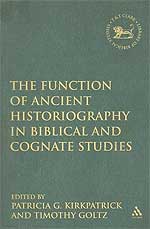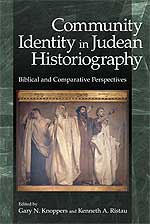This year’s Ancient Historiography Seminar will be meeting in a couple weeks at the Canadian Society of Biblical Studies annual meeting in Ottawa (25 May 2009). The theme for this year is “Historiography and Prophecy” and there is a full program planned. Feel free to check out the full schedule on the Ancient Historiography Seminar website.

In addition, the latest Review of Biblical Literature contained a fairly positive review of the first publication from the Ancient Historiography Seminar. Based on the York 2006 meeting, The Function of Ancient Historiography in Biblical and Cognate Studies (Patricia G. Kirkpatrick and Timothy D. Goltz, eds.; Library of Hebrew Bible/Old Testament Studies, T & T Clark International, 2008), contains essays by John Van Seters, Kurt Noll, Eve-Marie Becker, among others.
This book provides fresh perspectives from new scholars while engaging lingering questions from seasoned ones, and the function of historiography in biblical literature continues to be an issue of wide disagreement among biblical scholars but an emerging consensus considers it to serve primarily an interpretive function. Such a function(s) are discussed vis-à-vis J. Huizinga’s broad, theoretical definition of historiography as “the intellectual form in which a civilization renders account to itself of its past.” Based on the latter, issues of historicity tend to be downplayed as the central focus; given the assumption that these are modern scholarly concerns. Thus, socio-historical intent (ideology) tends to be given priority, seeking to understand these writings on their own terms. This shift in focus is a key feature of the volume. Purchase from Amazon.ca | Amazon.com | Eisenbrauns.com

The Seminar’s second volume, from the Saskatoon 2007 meetings, is expected to be published in June 2009. The volume, Community Identity in Judean Historiography: Biblical and Comparative Perspectives (Gary N. Knoppers and Kenneth Ristau, eds.; Eisenbrauns, Forthcoming, June 2009), contains essays by Gary Knoppers, Ehud Ben Zvi, Mark Boda, Kenton Sparks, John Van Seters, among others.
The volume deals with issues of self-identification, community identity, and ethnicity in Judahite and Yehudite historiography. The scholars present addressed a range of issues, such as the understanding, presentation, and delimitation of “Israel” in various biblical texts, the relationship of Israelites to Judahites in Judean historical writings, the definition of Israel over against other peoples, and the possible reasons why the ethnoreligious community (“Israel”) was the focus of Judahite/Yehudite historiography. Papers approached these matters from a variety of theoretical and disciplinary vantage points. For example, some pursued an inner-biblical perspective (pentateuchal sources/writings, Former Prophets, Latter Prophets, Chronicles, Ezra, Nehemiah), while others pursued a cross-cultural comparative perspective (ancient Near Eastern, ancient Greek, Hellenistic historiographies, Western and non-Western historiographic traditions). Still others attempted to relate the material remains to the question of community identity in northern Israel, monarchic Judah, and postmonarchic Yehud. Order from Amazon.ca | Amazon.com | Eisenbrauns.com




